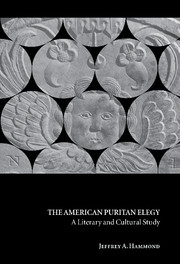Book contents
- Frontmatter
- Contents
- Preface
- Acknowledgments
- Introduction
- Chapter 1 Monuments enduring and otherwise
- Chapter 2 Toward an anthropology of Puritan reading
- Chapter 3 Weep for yourselves: the Puritan theology of mourning
- Chapter 4 This potent fence: the holy sin of grief
- Chapter 5 Lord, is it I?: Christic saints and apostolic mourners
- Chapter 6 Diffusing all by pattern: the reading of saintly lives
- Epilogue: Aestheticizing loss
- Notes
- Works cited
- Index
Chapter 1 - Monuments enduring and otherwise
Published online by Cambridge University Press: 22 September 2009
- Frontmatter
- Contents
- Preface
- Acknowledgments
- Introduction
- Chapter 1 Monuments enduring and otherwise
- Chapter 2 Toward an anthropology of Puritan reading
- Chapter 3 Weep for yourselves: the Puritan theology of mourning
- Chapter 4 This potent fence: the holy sin of grief
- Chapter 5 Lord, is it I?: Christic saints and apostolic mourners
- Chapter 6 Diffusing all by pattern: the reading of saintly lives
- Epilogue: Aestheticizing loss
- Notes
- Works cited
- Index
Summary
The simple funeral took place late in the afternoon on a gray Monday, the first day of December, 1712. As the seventy-year-old minister walked slowly toward the burial ground, leading the wagon that bore the plain coffin, he found comfort only in his belief that David Dewey's passing played some part, as yet unknown, in God's plan. On his arm leaned the widow, Sarah, closely followed by the four Dewey boys, ranging from four to twelve years old. A two-year-old daughter, gravely ill and being tended to at home, would die within two weeks. Behind the minister, the family, and the wagon filed about three dozen mourners. The minister patted Sarah Dewey's hand and whispered a few words into her ear. She lowered her handkerchief briefly from behind her veil and nodded.
David Dewey, a leading citizen of Westfield, a small town nestled in the Connecticut River Valley, was dead at thirty-six. A member of the Westfield church for twelve years, he had been ordained as one of the congregation's two deacons only six months earlier. Since arriving as a young man to help his uncles run their sawmill outside of town, he had served as constable, selectman, and schoolmaster. As his recent selection as deacon affirmed, Dewey was also a pious man. Four years earlier he had composed sixteen prose meditations on the faith; additional exhortations to his children were found among his papers after his death.
- Type
- Chapter
- Information
- The American Puritan ElegyA Literary and Cultural Study, pp. 11 - 41Publisher: Cambridge University PressPrint publication year: 2000

